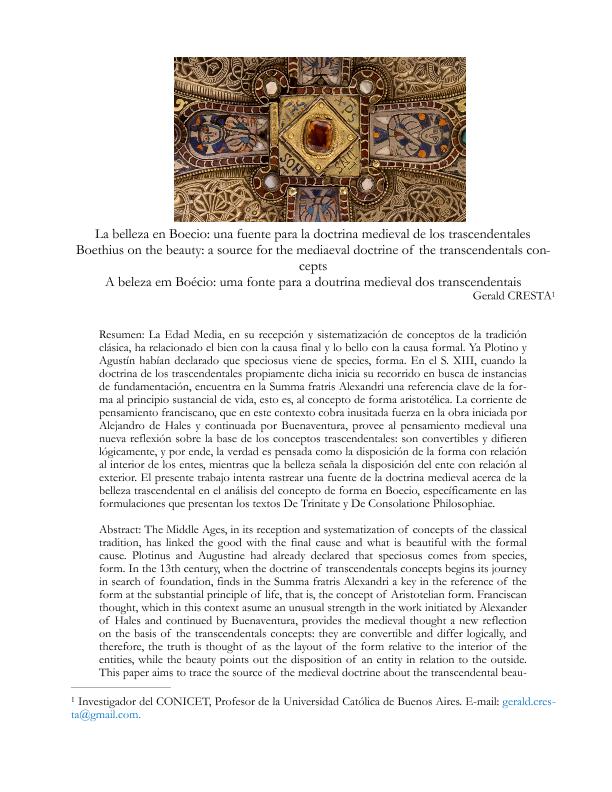Mostrar el registro sencillo del ítem
dc.contributor.author
Cresta, Norberto Gerald

dc.date.available
2021-01-21T23:52:45Z
dc.date.issued
2019-06
dc.identifier.citation
Cresta, Norberto Gerald; La Belleza en Boecio: una fuente para la doctrina medieval de los trascendentales; Universitat Autònoma de Barcelona. Institut d'Estudis Medievals; Mirabilia; 28; 1; 6-2019; 84-95
dc.identifier.issn
1676-5818
dc.identifier.uri
http://hdl.handle.net/11336/123407
dc.description.abstract
La Edad Media, en su recepción y sistematización de conceptos de la tradición clásica, ha relacionado el bien con la causa final y lo bello con la causa formal. Ya Plotino y Agustín habían declarado que speciosus viene de species, forma. En el S. XIII, cuando la doctrina de los trascendentales propiamente dicha inicia su recorrido en busca de instancias de fundamentación, encuentra en la Summa fratris Alexandri una referencia clave de la forma al principio sustancial de vida, esto es, al concepto de forma aristotélica. La corriente de pensamiento franciscano, que en este contexto cobra inusitada fuerza en la obra iniciada por Alejandro de Hales y continuada por Buenaventura, provee al pensamiento medieval una nueva reflexión sobre la base de los conceptos trascendentales: son convertibles y difieren lógicamente, y por ende, la verdad es pensada como la disposición de la forma con relación al interior de los entes, mientras que la belleza señala la disposición del ente con relación al exterior. El presente trabajo intenta rastrear una fuente de la doctrina medieval acerca de la belleza trascendental en el análisis del concepto de forma en Boecio, específicamente en las formulaciones que presentan los textos De Trinitate y De Consolatione Philosophiae.
dc.description.abstract
The Middle Ages, in its reception and systematization of concepts of the classical tradition, has linked the good with the final cause and what is beautiful with the formal cause. Plotinus and Augustine had already declared that speciosus comes from species, form. In the 13th century, when the doctrine of transcendentals concepts begins its journey in search of foundation, finds in the Summa fratris Alexandri a key in the reference of the form at the substantial principle of life, that is, the concept of Aristotelian form. Franciscan thought, which in this context asume an unusual strength in the work initiated by Alexander of Hales and continued by Buenaventura, provides the medieval thought a new reflection on the basis of the transcendentals concepts: they are convertible and differ logically, and therefore, the truth is thought of as the layout of the form relative to the interior of the entities, while the beauty points out the disposition of an entity in relation to the outside. This paper aims to trace the source of the medieval doctrine about the transcendental beauty in the analysis of the concept of form in Boethius, specifically the formulations presented in both texts De Trinitate and The Consolatione Philosophiae.
dc.format
application/pdf
dc.language.iso
spa
dc.publisher
Universitat Autònoma de Barcelona. Institut d'Estudis Medievals
dc.rights
info:eu-repo/semantics/openAccess
dc.rights.uri
https://creativecommons.org/licenses/by-nc-sa/2.5/ar/
dc.subject
BOECIO
dc.subject
FORMA
dc.subject
CAUSA
dc.subject
BELLEZA
dc.subject
PENSAMIENTO MEDIEVAL
dc.subject
CONCEPTOS TRASCENDENTALES
dc.subject.classification
Estudios Religiosos

dc.subject.classification
Filosofía, Ética y Religión

dc.subject.classification
HUMANIDADES

dc.title
La Belleza en Boecio: una fuente para la doctrina medieval de los trascendentales
dc.title
Boethius on the beauty: a source for the mediaeval doctrine of the transcendentals concepts
dc.title
A beleza em Boécio: uma fonte para a doutrina medieval dos transcendentais
dc.type
info:eu-repo/semantics/article
dc.type
info:ar-repo/semantics/artículo
dc.type
info:eu-repo/semantics/publishedVersion
dc.date.updated
2021-01-13T16:18:39Z
dc.journal.volume
28
dc.journal.number
1
dc.journal.pagination
84-95
dc.journal.pais
España

dc.journal.ciudad
Barcelona
dc.description.fil
Fil: Cresta, Norberto Gerald. Pontificia Universidad Católica Argentina "Santa María de los Buenos Aires". Facultad de Filosofía y Letras; Argentina. Consejo Nacional de Investigaciones Científicas y Técnicas; Argentina
dc.journal.title
Mirabilia

dc.relation.alternativeid
info:eu-repo/semantics/altIdentifier/url/https://www.raco.cat/index.php/Mirabilia/article/view/359625
Archivos asociados
